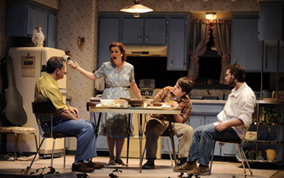Goodman's High Holidays: There's Probably A Decent Play In There Somewhere...
By Julienne Bilker in Arts & Entertainment on Nov 24, 2009 9:20PM

photo of Keith Kupferer, Rengin Altay, Max Zuppa and Ian Paul Custer by Liz Lauren
…but there’s way too much to dig through to find it. It’s an oversimplification, but our main problem with Goodman Theatre’s High Holidays, a new play by Alan Gross, boils down to this: it's overkill. Yes, some parts were cute and / or fun. Yes, there were some solid, touching moments, However, the good parts of this show were overshadowed by issues that made us feel alienated, rather than drawn-in.
At the beginning, the show feels very Neil Simon-esque-dramedy. It’s 1963, and 12 year-old Billy is studying for - or rather, avoiding studying for - his upcoming Bar Mitzvah. His anxiety is only increased by his mother Essie’s, as she frets over his lack of preparation, the fact that her older son is coming home from college, and the family dinner she’s preparing for the upcoming holiday, Rosh Hashanah. There’s some clever banter, there are strained relationships -- and there’s A LOT of Yiddish. This is one major alienating issue.
Those of us who understood the majority of the expressions used still needed to consult the Hebrew / Yiddish glossary included with our program. It’s one thing for us to have learned three or four words from the crib sheet -- in a language with which we’re slightly familiar -- it’s another for people who have no prior knowledge to pick up twenty-plus expressions in the few moments between receiving a program and curtain. On top of that, the glossary doesn’t provide any connotations, which can be pretty important - for example, “shvartza” may literally mean black, and refer to a black person or persons, as the glossary indicates, but the audience should be aware that it’s a derogatory term. We have no problem with the inclusion of other languages in scripts, but in this case the sheer amount of non-English seemed like a crutch. There are better ways of establishing character.
We always like to bring a second set of eyes and ears with us when we review a show, and our companion proved to be an excellent barometer. As someone unfamiliar with the territory, she didn’t feel she was missing all that much by not knowing any Hebrew or Yiddish - which is both a compliment to the actors and an interesting point about the script. If there is a significant amount of language that doesn’t need to be directly understood to convey meaning, maybe there are too many words. This idea held true for us throughout the evening, but particularly in the first act. As we said earlier, the play is evocative of Neil Simon -- except not quite as quick. And it’s unjustifiably 90 minutes long. We thought long and hard about the perfect word to describe it -- your vocabulary word for the day is circumlocutory. It’s about 75 minutes into the show before the real drama hits. We had difficulty keeping ourselves tuned in.
Despite being about the same length as the first, the second act moved much more quickly thanks to interesting dramatic conflict and more specificity of purpose. Although we’d still like to see it pared down even further, we didn’t have the urge to hack huge swaths of dialogue from the script, so it was a big improvement. All four actors - Rengin Altay, Ian Paul Custer, Keith Kupferer and Max Zuppa - had opportunities to really show what they’re made of, and they all gave commendable performances. However, we felt that their work was diminished by how quickly the script veered into melodramatic territory. Tempers flair at the drop of a hat when older son Rob (Custer) declares to his father (Kupferer) and mother (Altay) that he won’t be going back to school - it’s not a completely unwarranted escalation, but the explanations that come later seem like too little too late. Rob and Billy (Zuppa) have a great older-brother-smokes-up-younger-brother scene that comes as a welcome respite from the tension, however - surprise - it overstayed its welcome.
High Holidays deals with a multitude of issues that deserve exploration - living up to the ideals of one’s parents, what it means to “become a man,” performing rituals for the sake of others...however, after our three-plus hours in the theater, we weren't satisfied. Like we said at the beginning, there’s probably a decent play waiting to come out. It just hasn’t quite made it yet.
High Holidays plays through November 29, Goodman Theatre, 170 N Dearborn, Tickets $10-$40, 312-443-3800.